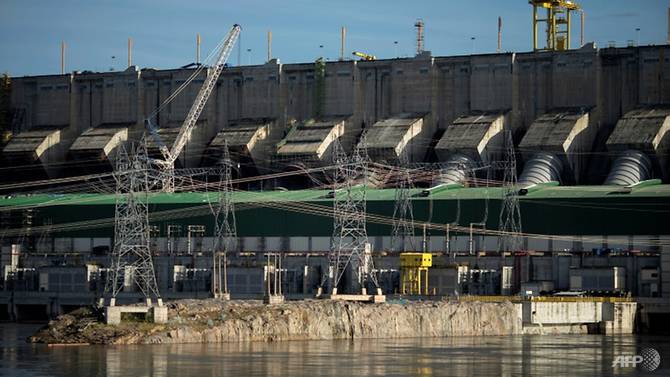May 16, 2025 | 10:26 GMT +7
May 16, 2025 | 10:26 GMT +7
Hotline: 0913.378.918
May 16, 2025 | 10:26 GMT +7
Hotline: 0913.378.918

View of the Belo Monte Hydroelectric Power Plant in Altamira, Para State, Brazil AFP/Mauro Pimentel
Developers have built hundreds of hydroelectric plants in the Amazon basin to take advantage of the allegedly "green" energy generated by its complex of rivers.
But climate researchers now know hydropower is not as good for the environment as once assumed. Though no fossil fuels are burned, the reservoirs release millions of tons of methane and carbon dioxide as vegetation decays underwater.
So called run-of-river (ROR) dams like Belo Monte along the Xingu River, which have smaller reservoirs and channels allowing reduced river flow, were meant to address the problem, but a study Friday in Science Advances found that has not been the case.
Bertassoli's team studied methane and carbon dioxide emissions during Belo Monte's first two years of operation and compared the results to levels prior to the reservoirs being filled, finding a threefold increase in greenhouse gas emissions.
"Once you have the flooding of dry land, the organic matter that was trapped in the soil starts to degrade," the professor of geology and climate change at the University of Sao Paulo told AFP.
These were the source of the bubbles he saw at one of the plant's reservoirs.
"Instead of a natural river, we now have a reactor that favors the production of methane," he added.
And as fellow author and climate researcher Henrique Sawakuchi pointed out, these "smaller" reservoirs are still quite large, with the largest on a partly dammed river where dead trees stand starkly white amid vast stagnant green channels.
Sawakuchi's brother Andre Sawakuchi, a University of Sao Paulo professor focusing on climate change and river systems who also participated in the study, added that this analysis highlights two issues to consider when building hydropower plants in the region.
One is the local environmental impact on aquatic species unique to the area," he told AFP. "The other is the social impact to indigenous communities that live along the river."
- Checkered history -
Indigenous and environmental groups protested the Belo Monte's proposed construction back in the 1990s, causing it to be abandoned before being revived again as an ROR plant in 2011.
Environmental groups protested the loss of the forest that had to be cleared for the site while indigenous groups resisted the loss of flooded land and redirected or siphoned natural river flow.
Andre Sawakuchi argues it is important to keep the Amazon flowing, despite increasing energy needs, and not to "disrupt this natural cycle with hydropower plants of any type.
"This is the pulse of the river," he said. "With a hydroplant, there is no more pulse."
The authors concluded in their study that if Brazil must continue to build ROR dams along the Amazon, then it is important to at least avoid flooding vegetation, thereby increasing greenhouse gases.
A 2019 study by the Environmental Defense Fund found that some of the world's hydropower plants are carbon sinks - meaning they take in more carbon through photosynthesis by organisms living in the water than they emit through decomposition - while others are net emitters.
"There is no utopia here," Bertassoli said. "Especially for countries that look so hard at hydropower as a sustainable 'green' answer to their energy needs."
AFP

(VAN) Fourth most important food crop in peril as Latin America and Caribbean suffer from slow-onset climate disaster.

(VAN) Shifting market dynamics and the noise around new legislation has propelled Trouw Nutrition’s research around early life nutrition in poultry. Today, it continues to be a key area of research.

(VAN) India is concerned about its food security and the livelihoods of its farmers if more US food imports are allowed.

(VAN) FAO's Director-General emphasises the need to work together to transform agrifood systems.

(VAN) Europe is facing its worst outbreak of foot-and-mouth since the start of the century.

(VAN) The central authorities, in early April, released a 10-year plan for rural vitalization.

(VAN) Viterra marked a significant milestone in its carbon measurement program in Argentina, called Ígaris, reaching 1 million soybean hectares measured.